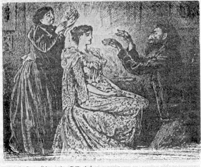Hypnose, acupunctuur, anesthesie en chirurgie
 Er komen steeds meer duidelijke aanwijzingen vanuit onderzoek dat hypnotherapie een duidelijke waarde heeft bij anesthesie en chirurgie. Zeer recent publiceerde onderzoekers de resultaten van een grote studie waaruit bleek dat hypnotherapie voor de operatie tijd spaarde en anesthetica. Totaal leverde dat circa $800 kostenbesparing op. Nu een overzichtsartikel in een toonaangevend tijdschrift voor anesthesiologen (narcotiseurs).
Er komen steeds meer duidelijke aanwijzingen vanuit onderzoek dat hypnotherapie een duidelijke waarde heeft bij anesthesie en chirurgie. Zeer recent publiceerde onderzoekers de resultaten van een grote studie waaruit bleek dat hypnotherapie voor de operatie tijd spaarde en anesthetica. Totaal leverde dat circa $800 kostenbesparing op. Nu een overzichtsartikel in een toonaangevend tijdschrift voor anesthesiologen (narcotiseurs). De conclusie was:
Recently, hypnosis has aroused interest, as hypnosis seems to complement and possibly enhance conscious sedation. Contemporary clinical investigators claim that the combination of analgesia and hypnosis is superior to conventional pharmacologic anesthesia for minor surgical cases, with patients and surgeons responding favorably.[1]
Eerder was al sprake van het feit dat hypnose kan helpen bij de angstreductie rond de operatie.[2]
While under hypnosis, patients can be taught to alter their psychophysiological functions. With this ability to alter these functions, patients can overcome the anxiety associated with surgery.
In 1991 had een anesthesioloog uit de USA na analyse van bijna 20 studies al geconcludeerd dat hypnose uitermate waardevol is en te weinig ingezet werd:[3]
The available literature suggests that hypnosis, suggestion, and relaxation are underutilized techniques which can shorten postoperative hospital stays, promote the physical recovery of patients from surgery, and aid in the psychological and emotional response of patients following surgery.
Ook bij gespecialiseerde operaties, zoals hartoperaties blijkt dat zelf-hypnose leidt tot verminderd gebruik van pijnstillers.[4]
Recent bleek uit een onderzoek naar de meningen en de kennis van anesthesisten op het gebied van de hypnotherapie, dat het merendeel onvoldoende kennis had. [5] De conclusie van de enquete onder meer dan 300 anesthesisten was:
The majority of respondents (63%) rated their level of knowledge on this topic as below average. Forty-eight per cent of respondents indicated that there was a role for hypnotherapy in clinical anaesthesia, particularly in areas seen as traditional targets for the modality, i.e. pain and anxiety states. Nearly half of the anaesthetists supported the use of hypnotherapy and positive suggestions within clinical anaesthesia. Those respondents who had experience of clinical hypnotherapy were more likely to support hypnosis teaching at undergraduate or postgraduate level when compared with those with no experience.
Maar verheugend was dat ondanks gebrek aan kennis, bijna de helft van alle anesthesisten aangaven dat er een duidelijke rol weggelegd leek te zijn voor hypnotherapie binnen de klinische anesthesie om tot pijn- en angstreductie te komen.
In een bekende kliniek in de USA, de Menninger kliniek heeft men al lang ervaring op dit gebied en kent men de waarde van hypnose bij brandwonden, binnen de kindergeneeskunde en rond de bevalling.[6]
Dit zijn slechts enkele publicaties in een veld van studies die aangeven hoe relevant hytpnotherapie kan zijn voor en na operaties, wat de waarde is van relaxatie technieken en zelfhypnose en de toepassing van hypnose bij een heel aantal aandoeningen.
Acupuncturist en samenwerking oncologen
Er zijn ook veel tekenen dat andere CAM richtingen bijdragen aan het werk wat de anesthesioloog doet. Acupunctuur is bij anesthesie natuurlijk al heel lang bekend. We geven hier nu alleen maar even een visie weer van een toonaangevende anesthesioloog. Professor Joseph Chiang van het Amerikaanse Anderson centrum voor kanker gaf enkele jaren geleden al aan, dat op basis van de ervaring die ze opgedaan hebben acupunctuur ingezet kan worden bij de behandeling van misselijkheid en braken, pijn, vermoeidheid, bijwerkingen van chemotherapie, straling, kanker chirurgie en een droge mond (xerostoma). We citeren hem hier:
The procedure (acupuncture) has been used for the past seven years at The University of Texas M. D. Anderson Cancer Center to relieve cancer therapy–related symptoms, according to Joseph Chiang, M.D., a professor in the Department of Anesthesiology. Acupuncture can help alleviate a wide range of side effects of chemotherapy, radiation, and cancer surgery, including nausea, vomiting, fatigue, pain, dry mouth, insomnia, and headaches, Dr. Chiang said.
Op basis van die inzichten is het mogelijk om in een Universitair centrum, zoals het Anderson centrum, door de reguliere oncoloog of oncochirurg naar een acupuncturist verwezen te worden. Een mooi voorbeeld van synergie en constructieve samenwerking:
At M.D. Anderson Cancer Center, patients can be referred for onsite acupuncture treatments by their oncologists. The acupuncturists are very careful to screen for pre-existing conditions that might be negatively affected by acupuncture, such as low white blood cell counts or bleeding caused by cancer therapies.
Before cancer patients consider acupuncture, they’re advised to first discuss the subject with their physician to see how it might affect their medical condition. Picking a competent acupuncturist who is licensed and credentialed is also important. Acupuncture is one of the complementary medical treatments most commonly covered by health insurance, but check with your carrier to be sure.
[1] Wobst AH. | Hypnosis and surgery: past, present, and future. | Anesth Analg. | 2007 May;104(5):1199-208.
[2] Hernandez A Jr, Tatarunis AM. | The use of pre-, intra-, and posthypnotic suggestion in anesthesia and surgery. | CRNA. | 2000 Nov;11(4):167-72.
[3] Blankfield RP. | Suggestion, relaxation, and hypnosis as adjuncts in the care of surgery patients: a review of the literature. | Am J Clin Hypn. | 1991 Jan;33(3):172-86.
[4] Ashton C Jr, Whitworth GC, Seldomridge JA, Shapiro PA, Weinberg AD, Michler RE, Smith CR, Rose EA, Fisher S, Oz MC. | Self-hypnosis reduces anxiety following coronary artery bypass surgery. A prospective, randomized trial. | J Cardiovasc Surg (Torino). | 1997 Feb;38(1):69-75.
[5] Coldrey JC, Cyna AM. | Suggestion, hypnosis and hypnotherapy: a survey of use, knowledge and attitudes of anaesthetists. | Anaesth Intensive Care. | 2004 Oct;32(5):676-80.
[6] Peebles-Kleiger MJ. | The use of hypnosis in emergency medicine. | Emerg Med Clin North Am. | 2000 May;18(2):327-38, x.

